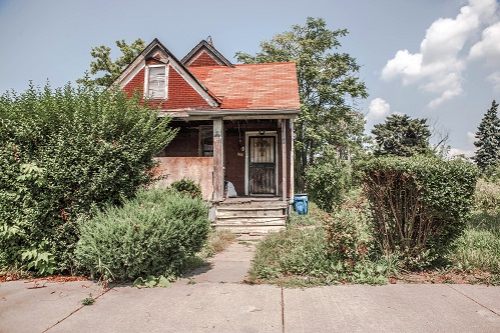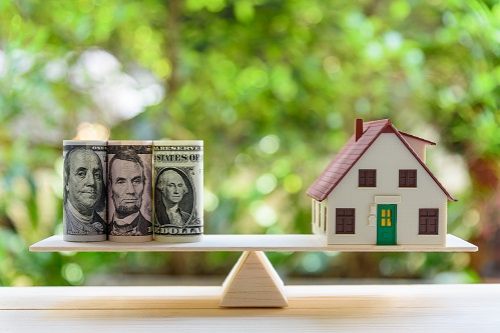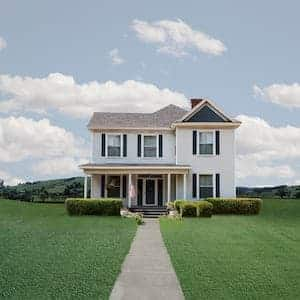- If a neighbor's tree falls on my house, whose insurance pays?
- Does homeowners insurance cover tree damage to a neighbor's property?
- What to do immediately after the tree falls
- What should I do if neighbor's tree fell on my house and I have no insurance?
- Can you be held liable for tree damage?
- Other homeowners insurance coverage for tree damage
- How to avoid tree damage
- Frequently asked questions
If a neighbor's tree falls on my house, whose insurance pays?
If a tree falls on your house, whether the tree was on your property or your neighbor's property, your insurance will cover the damage. If you file a claim for damage from a fallen tree, you will be responsible for paying your home insurance deductible.
The exception to this is if you can prove that the tree on your neighbor's property was dead, diseased, or damaged, and that the neighbor was aware of it. In this case, you might be able to show that the neighbor was negligent and therefore liable for the damage.
Does homeowners insurance cover tree damage to a neighbor's property?
Your homeowners insurance covers the damage if a tree falls on your home or another structure on your property. If it falls on your neighbor's house, their insurance would cover the damage; that is, unless you are negligent and responsible for the fallen tree.
If one of your trees falls and damages a neighbor's property, and there was no reason to believe the tree was in danger of falling, "generally speaking, it is your neighbor's insurance policy that is called upon to pay the damage," Dr. Robert Hartwig, director of the Risk and Uncertainty Management Center at the Darla Moore School of Business and former president of the Insurance Information Institute, "Since [their] insurance is being impacted," Hartwig says, "you probably won't face an insurance premium increase as a result."
However, "your neighbor could come after you to cover his deductible. Matter of fact, when one of my trees fell on my neighbor's fence, it destroyed some of his fence and damaged fruit trees. In the interest of neighborly relations, I voluntarily paid for a new pear tree, so between what the insurer paid and what I paid, he didn't have any out-of-pocket expense," says Hartwig.
The upshot? "My neighbor and I are still on speaking terms, which is a good thing. I paid for the new fruit tree, because I thought it was the right thing to do, although I was not obligated to do that." Hartwig's story underlines the fact that, in general, your neighbor's insurance covers your neighbor's property. However, although you and your insurance company may not legally have to make a payment, it's usually best to maintain good relations with those around you.
If a tree falls on a car, however, the owner's auto insurance will cover the damage under the comprehensive portion of the policy.
People ask
Does homeowners insurance cover a tree falling on a fence?
Yes, homeowners insurance will cover tree damage to a fence under the other structures portion of the policy.
What to do immediately after the tree falls
After a tree falls and causes damage, you should do the following:
- Ensure that everyone is safe. Move away from the tree and, if necessary, get everyone out of the house.
- Contact emergency services if necessary. If the tree is affecting power lines, for example, or is a a dangerous or precarious position, call for emergency assistance.
- Take pictures. Document all of the damage.
- Call your insurance company. The representative will help you with the next steps, and may instruct you as to immediate removal of the tree.
Does homeowners insurance cover tree damage to a car?
Homeowners insurance doesn't cover damage to cars as a general rule. If a tree falls on your car, you will need comprehensive insurance to cover the damage.
If your tree falls on a neighbor's car and it can be shown that you were negligent, their car insurance would pay to repair the car but may then initiate subrogation against the liability portion of your homeowners insurance. That means that the car insurance company goes after your home insurance company to recoup the claim payment.
If the neighbor in question doesn't have full coverage, they may choose to sue you for the damages, in which case your home insurance liability coverage would apply.
What should I do if neighbor's tree fell on my house and I have no insurance?
If you believe the neighbor was negligent in caring for the tree, you may be able to file a liability claim against their home insurance. This will only work if the tree was dead, diseased or damaged, and you can show that the neighbor knew it was at risk of falling and did nothing.
In the absence of negligence, you will be responsible for your own repairs if you don't have insurance.
Can you be held liable for tree damage?
If a healthy tree went down in a storm, you can't be blamed, However, if there is negligence on your part, you can be held liable for the damage. If your tree was dead or diseased, and a judgment or settlement finds that you knew or should have known, you could be legally liable for the damages. This is especially true if your neighbor has documentation proving that he or she complained to you or the city about the state of your tree.
Your homeowners insurance policy covers liability, including defending you in a lawsuit. Your neighbor could submit a claim to your insurance company if they believe you are at fault. If your neighbor sues you, claiming that you were negligent in failing to take care of your tree, your insurance company will pay to defend your case, and will pay for damages if you're responsible. The cost of legal defense is in addition to policy liability limits, although the amount of damage paid for is subject to these limits.
People ask
Can you file a claim against your neighbor’s insurance?
Yes. You can file a liability claim against your neighbor's insurance policy if you believe the neighbor's negligence caused damage.
Other homeowners insurance coverage for tree damage
Another option under your own homeowners insurance policy is the damage to property of others coverage in the other coverages portion of the liability section of most homeowners insurance policies. This coverage does not have a deductible and can be used without a judgment or admission of legal liability, which can help speed up the payment process. The amount of coverage for Damage to Property of Others, typically $1,000, is in addition to the policy's liability limits. However, remember that using your own insurance constitutes a claim against it and a possible premium increase. Therefore, only use this type of coverage if you can't afford to pay for the damage yourself.
If your tree falls on your neighbor's porch, your neighbor's homeowners insurance will usually pay for the damage. However, remember that each area has different laws, and each policy has exclusions explaining what is not covered.
How to avoid tree damage
To avoid having a tree damage your property:
- Have your trees trimmed and inspected periodically.
- If you're worried about trees on your property falling during a storm, have them trimmed or removed.
- If you are concerned about a neighbor's tree, write a polite letter to your neighbor and/or the city, keep a copy and send it by registered mail. Hopefully, this will encourage them to remove it, but at the very least, it will provide a record that the tree was dangerous and the property owner knew about it. If something happens, you'll have evidence of negligence.
Frequently asked questions
Does homeowners insurance cover tree removal?
If a tree falls and does damage, homeowners insurance will cover the removal as part of the repairs. However, if no damage is done, your policy won't cover tree removal. Homeowners insurance never covers removal of a tree that is dead or diseased but has not yet fallen.
Who is responsible if my neighbor's dead tree falls on my house?
If your neighbor's tree falls on your house, your homeowner's insurance usually pays for the damage. However, if you can prove the neighbor knew the tree was dead, their liability coverage might pay for the damage.
Are trees considered other structures on homeowners insurance?
No. Trees and other landscaping are not considered structures.




